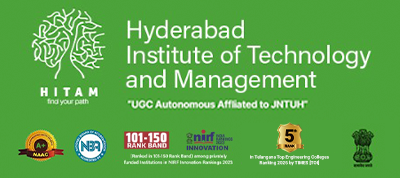Department of Electrical
& Electronics Engineering
The Department offers quality education, combining innovation with hands-on learning in EEE.
Course Overview
The department offers B.Tech program. The curriculum covers core subjects, electives, labs, and projects, with a focus on Power Systems, Electrical Machines, Power Electronics and Electric Vehicles. Faculty members actively publish in top research journals.

Our Vision
To become a role model department where students are nurtured to achieve multidisciplinary skills leading to their employability, research and can contribute to the society
Our Mission
To implement effective learning Strategies with a well-structured curriculum and assessment methods
To develop expertise in emerging technologies through collaboration with industry and Academic institutions
To empower socially responsible Engineers by promoting sustainable practices that address societal needs and enhance employability
Program Educational
Objectives (PEOs)
To excel in technical and professional careers in design and product realization, effectively meeting the demands of industry and organizations
To excel in technical and professional careers in design and product realization, effectively meeting the demands of industry and organizations
To attain holistic education to enhance professional skills with changing societal needs
Program Specific Outcome's (PSOs)
Analyze, Model, Test and provide engineering solutions in the areas related to electric drives, control and power systems.
Apply fundamentals of electrical engineering to simulate and develop electrical and electronic systems using MATLAB, PSPICE tools
Program Outcomes
Apply the knowledge of mathematics, science, engineering fundamentals, and an engineering specialization to the solution of complex engineering problems.
Identify, formulate, review research literature, and analyze complex engineering problems reaching substantiated conclusions using first principles of mathematics, natural sciences, and engineering sciences.
Design solutions for complex engineering problems and design system components or processes that meet the specified needs with appropriate consideration for the public health and safety, and the cultural, societal, and environmental considerations.
Use research-based knowledge and research methods including design of experiments, analysis and interpretation of data, and synthesis of the information to provide valid conclusions.
Setting the highest ethical standards for self and others in everything we do. Our actions, behaviors and conduct must always generate trust and confidence in our stakeholders.
Create, select, and apply appropriate techniques, resources, and modern engineering and IT tools including prediction and modeling to complex engineering activities with an understanding of the limitations.
Understand the impact of the professional engineering solutions insocietal and environmental contexts, and demonstrate the knowledge of, and need for sustainable development.
Apply ethical principles and commit to professional ethics and responsibilities and norms of the engineering practice.
Function effectively as an individual, and as a member or leader in diverse teams, and in multidisciplinary settings.
Communicate effectively on complex engineering activities with the engineering community and with society at large, such as, being able to comprehend and write effective reports and design documentation, make effective presentations, and give and receive clear instructions.
Demonstrate knowledge and understanding of the engineering and management principles and apply them to one’s work as a member and a leader of a team, in managing projects in a multidisciplinary environment.
Recognize the need for, and have the preparation and ability to engage in independent and life-long learning in the broadest context of technological change.
Our Faculty
Dr. Pedda Suresh Ogeti
Ph.D 22 Years ExperienceProfessor
Power Electronics
Dr. Madduluri Chiranjivi
Ph.D 16 Years ExperienceAssociate Professor
Power Systems
Mr. Suresh Kanaparthi
M.Tech 18.8 Years ExperienceAssociate Professor
Power Electronics
Mr. Salva Satyanarayana
M.Tech 14 Years ExperienceAssistant Professor
Power Systems
Ms. Pillalamarri Madhavi
M.Tech 8.3 Years ExperienceAssistant Professor
Power Electronics
Mr. D. Hari Krishna
M.Tech 1.1 Years ExperienceAssistant Professor
Communication systems
Ms. Thirlangi Sirisha
M.Tech 4.8 Years ExperienceAssistant Professor
Power Electronics
Mr. Mallarapu Siddartha
M.Tech 7.8 Years ExperienceAssistant Professor
Power Electronics
Ms. U Divya
M.Tech 5.8 Years ExperienceAssistant Professor
Power Electronics
Ms. M. Rani
M.Tech 5 Years ExperienceAssistant Professor
Power Electronics
Mr. Raviteja Madala
M.Tech 1.7 Years ExperienceAssistant Professor
Power Electronics
Mr. Ravi Naragani
M.Tech 14.11 Years ExperienceAssistant Professor
Power Electronics
Ms. CH. Rajasri
M.Tech 5.11 Years ExperienceAssistant Professor
Power Electronics
Ms. CH. Swathi Lakshmi
M.Tech 4.11 Years ExperienceAssistant Professor
Power Electronics
Labs
| SNO | NAME OF THE LAB | LIST OF MAJOR EQUIPMENTS AVAILABLE IN LAB |
| 1 | Electrical Machines-I | DC Shunt Motor DC Compound Motor DC Series Motor DC shunt Generator DC Compound Generator DC Series Generators DC Motor-Generator Set Alternator Rectifier |


